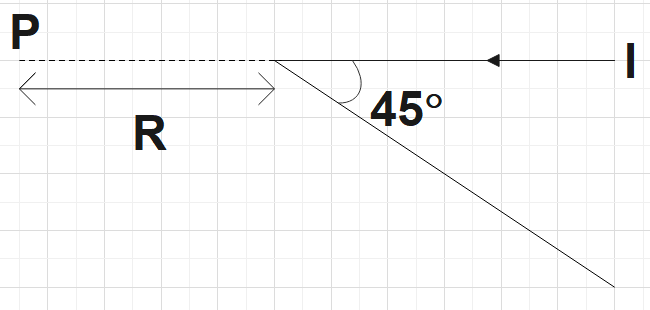Question
Question: A long straight wire carrying current I is bent at its midpoint to form an angle of \(45{}^\circ \) ...
A long straight wire carrying current I is bent at its midpoint to form an angle of 45∘ induction of magnetic field at point P distant R from point of bending is equal to:

A. 4πR(2−1)μ0I
B. 4πR(2+1)μ0I
C. 42πR(2+1)μ0I
D. 22πR(2−1)μ0I
Solution
As a first step, one could read the question well and hence note down the given points carefully. Then you could recall the expression for magnetic field induction as per the given conditions in the question. Then carry out the substitutions accordingly to find the answer.
Formula used:
Magnetic field induction,
B=4πdμ0I(sinϕ1+sinϕ2)
Complete step-by-step solution:
In the question, we are given a long straight wire that is carrying current I that is bent at its midpoint forming a 45∘angle. We are supposed to find the magnetic field induction at point P that is at a distance R from this point of bending.
Let us recall the expression for magnetic induction given by,
B=4πdμ0I(sinϕ1+sinϕ2)…………………………………………. (1)
From the given figure, d=Rcos45∘
Also, ϕ1=−450and ϕ2=90∘
One could substitute these values into equation (1) to get,
B=4πRcos45∘μ0I(sin(−45∘)+sin90∘)
Substituting the sine and cosine of these angles, we would get,
⇒B=4πRμ0I2(1−21)
∴B=4πR(2−1)μ0I
Therefore, we found the magnetic field induction at the point P due to the given bend wire would be, B=4πR(2−1)μ0I
Hence, option A is found to be correct.
Note: We could define electromagnetic or magnetic induction as the production of an electromotive force across an electrical conductor in the vicinity of varying magnetic fields. The man behind the discovery of induction is Michael Faraday and it was mathematically described by maxwell.
